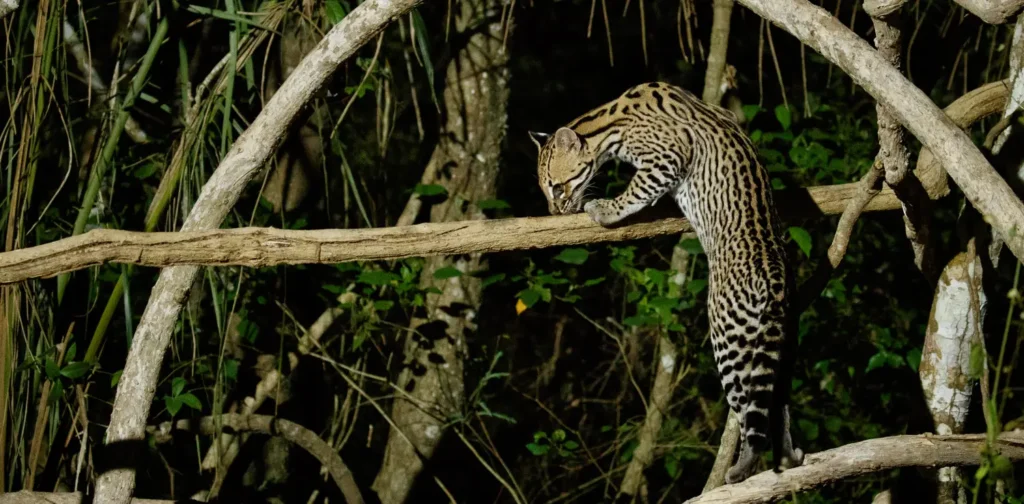How Semende Tribe in Indonesia Coexists with Wild Cats

Photo: Vladimircech on Freepik.
Human lives are intertwined with other living things, including wildlife. However, anthropogenic activities and development have increasingly decreased wildlife habitats, resulting in human-wildlife conflicts that further threaten their existence. In Indonesia, the people of the Semende Tribe strive to protect their forest’s biodiversity by living side by side with wildlife, especially wild cats.
Population Decline and Threats of Extinction
Wild cats are carnivorous predators under the family Felidae. Like predators in general, they are strong and fast. Many of them live in forests, with an important role in the food chain and for ecosystem balance.
Around the world, there are 40 species of wild cats, and nine of them are spread across three Indonesian islands: Sumatra, Java, and Borneo. Some wild cat species include the Sunda clouded leopard (Neofelis diardi), the Asian golden cat (Catopuma temminckii), the flat-headed cat (Prionailurus planiceps), and the Sumatran tiger (Panthera tigris sumatrae). Unfortunately, ecosystem damage due to deforestation and other factors has resulted in the wild cat population decline, driving some species to the Endangered status.
This population decline goes hand in hand with human’s negative perception of these predators. Generally, wild cats are seen as threats to farm animals and human lives, leading to people killing them. Wild cat hunting is also a major threat as the illegal wildlife trade offers a significant price. Furthermore, everything is exacerbated by habitat loss due to deforestation and land use change. Climate change also affects wild cats’ food and water source.
Wild Cats and the Semende Tribe
The Semende Tribe in South Sumatra, Indonesia, understands the importance of coexisting with wildlife, including wild cats. Living around the Bukit Barisan Selatan National Park, people of Semende Tribe encounter wild cats in their daily life. Then, instead of treating them as threats, they treat wild cats like family and build a strong and mutually beneficial relationship with them.
For example, the Semende Tribe essentially makes wild cats the ‘protectors’ of their crops, driving away pests like boars, rats, and birds. They see rice paddy as sacred, so all that helps ensure its sustainability is seen as family.
Moreover, most people from the Semende Tribe consider the Sumatran tigers their ancestors. So, they believe that wild cats, including tigers, will not attack them as long as they respect their existence.
“Our people are not allowed to disturb the wild cat habitat around the village because their existence functions to help us protect our crops from pests,” said Syarifudin from the Semende Tribe in the Indigenous forest territory of Jurai Pancung.
Coexisting with Wildlife
Human population and biodiversity grow in opposite directions. As human population increases, biodiversity decreases. This means the habitat loss of various wild species is likely to continue, further threatening their populations. Therefore, learning to peacefully coexist with them becomes the only option as the expansion of human’s living space continues. We must face this reality and properly manage our shared existence for the sustainability of all living things on the planet.
Translator & Editor: Nazalea Kusuma
The original version of this article is published in Indonesian at Green Network Asia – Indonesia.

Co-create positive impact for people and the planet.
Amidst today’s increasingly complex global challenges, equipping yourself, team, and communities with interdisciplinary and cross-sectoral insights on sustainability-related issues and sustainable development is no longer optional — it is a strategic necessity to stay ahead and stay relevant.


 Strengthening Resilience amid Growing Dependence on Space Infrastructure
Strengthening Resilience amid Growing Dependence on Space Infrastructure  Indian Gig Workers Push Back Against 10-Minute Delivery Service Strain
Indian Gig Workers Push Back Against 10-Minute Delivery Service Strain  Call for Governance: Grassroots Initiatives Look to Scale Efforts to Conserve Depleting Groundwater
Call for Governance: Grassroots Initiatives Look to Scale Efforts to Conserve Depleting Groundwater  Integrating Environment, Climate Change, and Sustainability Issues into Education Systems
Integrating Environment, Climate Change, and Sustainability Issues into Education Systems  Finally Enforced: Understanding the UN High Seas Treaty
Finally Enforced: Understanding the UN High Seas Treaty  Risks and Opportunities of Submarine Communication Cables for Sustainable Development
Risks and Opportunities of Submarine Communication Cables for Sustainable Development